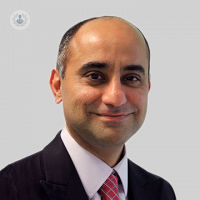COVID-19 breast cancer frequently asked questions
Escrito por:If you have breast cancer, it is natural that you are worried about COVID-19 and the future of your breast cancer treatment. While it’s not easy to advise people on their personal situation, consultant breast surgeon, Mr Haresh Devalia has answered some frequently asked questions in the hope it might help to guide you during these difficult times.
For any specific queries or doubts, please refer to your GP or hospital team who will help you.

I have breast cancer, am I more at risk now?
No, just receiving a diagnosis of breast cancer doesn’t mean that you are more at risk of becoming seriously ill if you contract COVID-19. It is the side-effects of treatments, such as chemotherapy and immunotherapy, that pose a threat.
Does hormone therapy make you more vulnerable?
During the current COVID-19 climate, if you are post-menopausal and have ER positive breast cancer, it means that we can very likely control and shrink the cancer using hormone therapy.
ER positive tumours are generally very responsive to hormone therapy, and ladies who have this type of cancer are currently in a favourable situation. You do not need to worry as this treatment does not affect the immune system, so if you are currently in treatment, you should continue taking your medication at home as normal.
Why have my chemotherapy treatments been stopped?
Chemotherapy is far riskier. For the time being, some treatments are still ongoing whilst others have stopped.
If your chemotherapy has stopped, it is likely because you have ER-negative or advanced breast cancer and it is deemed too risky to continue the treatment. This is because chemotherapy reduces your immunity and it makes you more prone to develop infections, such as COVID-19. Instead, many patients will be offered surgery instead and for any new cases, this option will be offered as a first-line of treatment for now.
These decisions are, however, made on a case-by-case basis by a multidisciplinary team, consisting of surgeons, oncologists, radiologists, pathologists and breast care nurses. The latter is very important as they will relay information between you and the doctors.
I'm receiving radiotherapy, am I more at risk of getting ill?
No, radiotherapy only causes local side-effects and doesn’t affect your immune system in the same way chemotherapy does.
Although the systemic side effects of this treatment are minimal, the frequency of treatments required may increase your exposure to hospital staff and therefore your potential exposure to COVID-19. At all our clinics, we have strict social distancing measures set up to limit the patient’s exposure. If you are concerned, you can read about these extra precautions here.
Depending on the type of cancer you have, radiotherapy is typically given every day for around three weeks. However, it has been shown that some patients now benefit from having the full radiotherapy dose over just five days, according to the FAST-forward trial published very recently in The Lancet. If you are interested in taking part in a similar trial, you should ask your oncologist for more information.
When will my breast surgery procedure take place?
If you have ER negative breast cancer or deemed a high-risk patient, the multidisciplinary team may decide to perform your surgery sooner than later.
If you are on hormone treatment, then it is safe to wait up to two to three months until the COVID-19 settles. Recently, however, patients are being given earlier dates, within a few weeks, depending on their local waiting list.
What extra precautions can a breast cancer patient take right now?
Follow the UK national guidelines on social distancing and most importantly look after yourself. This includes staying active, eating well, getting social support and continuing exercise whenever you can.
Your mental health is just as important as your physical health and they are undeniably linked, so make sure you keep doing the things you enjoy and are getting enough support from your friends and family.
Don’t be afraid to consider psychological support if you feel you would benefit from it - there are many services available to help.
To speak to Mr Haresh Devalia, visit his Top Doctors profile and book an e-Consultation with him.


